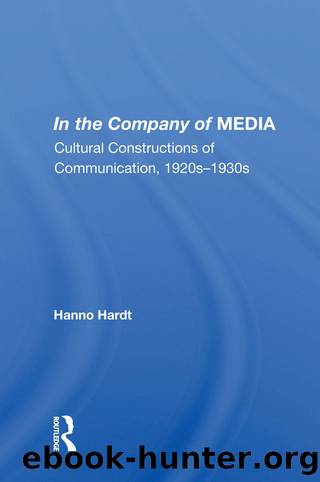In The Company Of Media by Hanno Hardt

Author:Hanno Hardt [Hardt, Hanno]
Language: eng
Format: epub
Tags: Social Science, General, Sociology
ISBN: 9780429719479
Google: mNmiDwAAQBAJ
Publisher: Routledge
Published: 2019-04-02T04:53:06+00:00
Fortunately or unfortunately for the editorial writer, the German delegation had already suggested that "special programs will have to be put on because of the differences in time between the two countries" (NYT 1929f, 1).
In summary, there is a sense of purpose and direction in the history of early German radio. Its Kulturanspruch (cultural claim) seems firmly secured in the expressed rationale for the uses of broadcasting in the public sphere, although the struggle over the boundaries of radio is incomplete, and even inconclusive at this time. Communication technology as context of power relations becomes a useful site for social and political observations, however. Broadcasting also offers a measure of the modern public sphere, whose use varies from society to society, where it is differently defined and assigned. For instance, in the United States, the application of broadcasting technology promotes an understanding of individualism that is identified with choice (of consumption) from a variety of commercially determined sources, while in Germany individualism is implied in opportunities for cultural advancement offered through a centrally controlled system of broadcasting. These differences signify a different kind of individual activity or personal involvement, and the results are profound; they range from the notion of commercials as enlightenment to an insistence on the cultural mission of radio, prioritizing either entertainment or education and information or interpretation. The idea of entertainmentâhowever central to an understanding of American radioâis completely absent from the New York Times coverage of German broadcasting. In fact, radio in Germany is a serious business, whose societal responsibility is discharged by an authoritative institution rather than by private ownership and its commercially dictated policies.
Reporting about the affairs of German radio also reflects an increasing nervousness in Germany, ranging from various demands for sharing the power of broadcasting to the outright use of radio to interfere in the psychological and political spheres of society and the manipulation of the minds of people. The idea that broadcasting has a powerful effect on individuals and society is implicitly supported by the Times, which finds the consequences of such impact not only newsworthy, but reacts in what has now become a predictable journalistic response to a belief in media effects by reporting events, including the premeditated use of selected media by individuals or groups, that reinforce the idea of shaping public opinion through exposure to media fare. In this historical context, the Times coverage shifts from cultural to political contexts of radio and discloses an increasing level of conflict in society.
American readers, involved in their own economic catastrophes of the late 1920s, may have found more worrisome news about Germany in the pages of The New York Times. But the brief reports about German radio, if noticed, certainly help reinforce the feeling of an impending crisis, in which broadcasting is to play a major role. The Times recognizes the growing political pressures to convert broadcasting in Germany into a much more inclusive and significantly more responsive medium of social and political communication in a widening conflict between the domains of Kultur and politics.
Download
This site does not store any files on its server. We only index and link to content provided by other sites. Please contact the content providers to delete copyright contents if any and email us, we'll remove relevant links or contents immediately.
Eats, Shoots & Leaves by Lynne Truss(1340)
Nickel and Dimed by Barbara Ehrenreich(1138)
Midnight's children by Salman Rushdie(1015)
The Imaginary Invalid by Molière(1001)
Bring Up the Bodies by Hilary Mantel(880)
Black Coffee (Poirot) by Agatha Christie(844)
The 500 by Matthew Quirk(807)
The Lovely Bones by Sebold Alice(806)
The Seagull by Anton Chekhov(802)
Buried Child by Sam Shepard(756)
Steven Berkoff by Steven Berkoff(738)
An Ideal Husband by Oscar Wilde(730)
The Bourgeois Gentleman (World Classics) by Molière(722)
The Comedy Bible by Judy Carter(666)
Profiles by Tynan Kenneth; Tynan Kathleen;(661)
Finding Roger by Rick Elice(656)
Tobacco Road by Erskine Caldwell(649)
The Guys by Anne Nelson(606)
Mrs. Warren's Profession by George Bernard Shaw(599)
